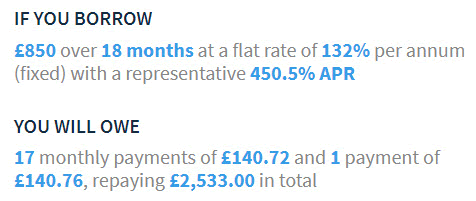Yesterday the government announced that it was dropping the proposed new logbook loan legislation. This is a very disappointing move, the bill would have had all-party support.
I agree with these comments on Twitter:
Strange one – never spoken to anyone who didn’t think it was a good idea and the current legislation causes huge problems for some people. Joe Lane.
Pretty odd decision. These types of credit regularly cause huge consumer detriment. The need for reform seemed overwhelming. Nick Pearson.
This article is looking at how the legal and regulatory framework for logbook loans needs to be changed. If you currently have a logbook loan which is unaffordable, read Refunds of interest from large high cost loans as that may help.
Not quaint but dangerous
Two weeks ago, speaking at an event on the future of high-cost credit, the FCA’s CEO, Andrew Bailey, referred to logbook loans as quaint, because of the antiquated legislation they are based on. At that time it was expected the new Goods Mortgages bill would have replaced the 1878 and 1882 statutes which govern Bills of Sale.
Now that legislation isn’t going to come to the rescue, quaint doesn’t seem the right term anymore. FCA needs to act speedily to reduce the detriment being caused by logbook loans.
Logbook loans are not a large part of the high-cost credit market. In 2016 there were 30,000. But they are used by a very vulnerable group of people. Citizens Advice research found that people coming to them for debt help who had logbook loans had on average more than twice as many debts as other Citizens Advice debt clients.
And, unlike any other sort of lending, they can harm people who were not party to the loan at all. Someone can buy a car and have no idea it is subject to a logbook loan and that the seller doesn’t legally own the car. The car can then be repossessed by the logbook lender with no compensation for the innocent buyer.
What should the FCA do
I suggest there are four areas the FCA needs to take action as soon as possible.
Cap the cost of logbook loans
Most logbook loans exceed the interest rate cap that has been imposed on payday loans, so people are paying more in interest and charges than the amount they borrowed. A couple of examples:
From Varooma:

From logbookloans.com:

Applying the payday loan cap to logbook loans would be simple and would reduce the harm they cause.
Ban top-up loans and refinancing
Although the interest cap was the measure that caught the headlines, a major gain from the payday lending reforms came from the restriction on rollovers. A version of this is even more important for logbook loans because of the size and duration of the loans – for someone to refinance just once prolongs the time in expensive debt considerably.
This is a very common issue with logbook loans. A couple of examples from readers in the last month:
I currently have a logbook loan with about 18 months left to pay off. I am up to date with the payments at present. I have rolled this over 4 times now and paid about £2500 in interest so far on a £1000 loan.
I have had a logbook loan on my old vehicle and rolled the loan over / renewed loan and additional borrowing about 5 times my car then had to be scrapped so I had to transfer the debt to a personal loan with loans2go.
So I suggest a logbook lender should:
- not be allowed to offer top-ups or refinancing during the term of a loan;
- not be allowed to offer a second loan until at least six months after the previous loan has completed.
Enforce better affordability checks
People taking out logbook loans usually have other debts and are desperate. The lenders should, therefore, conduct detailed affordability assessments, including looking at the applicant’s bank statements and credit records – they cannot just rely on an application form and assumptions about standard levels of expenses.
Check for irresponsible advertising
Logbook loans are serious, expensive, long-term secured loans. Adverts such as this one from Mobile Money on Facebook are irresponsible:

Logbook loans should not be advertised as quick and simple sources of immediate cash. “Try out a loan” makes it sounds like test driving a car!
There should be a standard statement such as Warning: your car is at risk if you do not keep up payments on a logbook loan on every advert, including social media, and included in sponsored articles or anywhere where the lenders pay for links.
The problem of cars with logbook loans being sold
I don’t know if the FCA feels it can prevent logbook lenders exercising their rights to repossess their car when it has been sold to someone not aware of the logbook loan. That comes more under the heading of treating the public fairly than treating customers fairly!
But making the four changes I have suggested above should go a long way to reducing this problem. If there are proper affordability checks, which is likely to mean fewer logbook loans which are also smaller in size and at a lower interest rate, then more borrowers will feel they can repay the loan and keep their car, rather than try to sell it.
Over to the FCA then
In deciding to shelve the proposed legal reforms, the government said:
The government will continue to work with the FCA as they carry out their high-cost credit review, and then further consider government action on alternatives to high-cost credit in light of the FCA’s review.
The FCA has considerable powers to reform the logbook loans market and it needs to use them as soon as possible.
But what about the problem of people buying a car used for a logbook loan?
The FCA can do a lot to protect people from being given unaffordable logbook loans, for example by introducing a price cap and by preventing loans from being topped up.
But it will be more of a challenge for the FCA to introduce new rules that will halt the problem of someone who had bought a car with a logbook loan on it having it repossessed. On 12 June 2018, Yvonne Fovargue, MP, challenged a Treasury minister on this in Parliament, saying:
Could the Minister explicitly say what powers the FCA has to protect innocent consumers who buy cars in good faith, who cannot check anywhere whether they are subject to a logbook loan, and yet who can still have them repossessed?
the minister didn’t give any clear answer.



Susanna Walker says
I agree legislation needed to be re-newed as its antiquated not “quaint”.
I have a log book lender as a client whose customer base is well looked after. Full credit checks are carried out, full income assessments are done with proof of income provided. Loans are not rolled. You can only have one loan a year. His interest is capped as he is authorised as a high cost short term lrnder so he treats it as the same lending criteria. In the last year he has had only one complaint and that was because he wouldn’t lend to the complainant. So I know from experience not all log book lenders treat consumers badly.
The problem I do strongly agree with is the lack of a register for Log Book secured vehicles it’s no different to HP as far as third party ownership is concerned. Perhaps log book secured vehicles should be added to the HPI register. In fairness the guilty party is the owner that sells the car knowing it to be secured.
Alan McIntosh says
In Scotland they do need to be on the HPI Register as Bills of Sale are not allowed. So the Log Book loan firm needs to buy the car and then give it back using a HP agreement.
Graham says
The problem is the seller isn’t the one losing a car they bought innocently. In HP law there are provisions protecting buyers in ‘good faith’ but that’s not repeated in Bills of Sale.
Bit naff this of the government, they had it right. They’ve ditched something they agreed on to focus on disagreeing on something else!
Grrr
Graham
Sue says
Hi
Thanks to this site Loans2go have just agreed to settle through complaint with the FOS so hopefully won’t be too long before I receive the cash. They used delay tactics, sometimes not responding but fingers crossed they pay out within the four weeks. Keep at them everyone
Sara (Debt Camel) says
Well done!
Sue says
E-mail with signed settlement offer sent back to FOS this morning. Money in the bank this afternoon off Loans2Go. Was expecting it to be 4 weeks, soooo happy.
Suzanna Walker says
I can imagine that the government have more pressing issues like Brexit to consider when looking at the numbers of log book loans and consumers affected, out there. The Esro Report carried out for the FCA, didnt class log book loans as the same risk as payday lending and the FCA have dealt with payday lenders resulting in Wonga going into administration and unable to pay refunds. In 2014 log book loans peaked at 52,000 but since then have considerabley dropped to around the 37,000 for last year. If you compare the number of consumers involved in log book loans then they pale into insignificance when looking at the millions of people trapped in overdrafts and the problems they bring. I would think that due to the millions of people being affected by overdrafts not 37,000, that the goverment and the FCA would consider overdrafts to be more of a priority.
Sara (Debt Camel) says
And in the article above I acknowledged the small size of the market.
But these loans are very dangerous, trapping their borrowers into long-term very expensive secured debt and making it hard for them to access debt solutions. And they are also a problem for anyone that buys a car unaware there is a logbook loan on it as it can be repossessed with no compensation.
And the really strange thing is that there was cross party agreement on the Bill.
Suzanna Walker says
The average log book loan according to the FCA is 12 to 13 months that isnt classed as long term. Also the owners of vehicles do have a duty of care thenselves to not borrow money they cant afford to pay back. They also know that they shouldnt be selling the car if they dobt own it so agree that log book losns should be listed like HPI. The average loan is only 65 to 70% of the vehicle value , a lot of the 37,000 loans are business users such as taxi drivers who need to borrow funds to get repairs done to keep their taxi legal and on the road. As you know taxi drivers are self employed and cant always prive their earnings to the level a high street lender would require. Its important that a balsnce for this section of log book loan users are considered.
Sara (Debt Camel) says
“the owners of vehicles do have a duty of care themselves to not borrow money they can’t afford to pay back. ” The Financial Ombudsman often takes the view that the duty of the lender to lend responsibly is greater… I would hope that you agree with me that the advert shown in the article above is simply inappropriate for high cost, secured lending.
I am not suggesting that these loans should be banned. I am suggesting the legal framework should be updated, there should be a list of them like HP and that the rates should be capped.
Suzanna Walker says
I agree that the advert is dreadful and under FCA authorisation it isnt compliant and needs reporting. I have seen many log book loan applications and the number of times the borrower has falsfied their income or their expenses is quite a few and therefore they failed to get a loan. Some lenders collect evidence but don’t analyse it. I cant find any evidence from the Ombudsman that supports your statement that lenders are much more responsible than a borrower when applying for credit could you please point me to where it is.
Suzanna Walker says
This is from the Ombudsman : 2016 when figures for total loans were lower by large % . They got fewer than than 10 per month thats 120 per year put of 37,000 customers, they upheld 40% that means out of 120 complaints only 48 were upheld. I,m not surprised tgat the government has put this on hold, as figures are dropping each year.
We can normally consider complaints from borrowers about their logbook loans provided they fall under our rules (see below). We do not receive a large volume of complaints about logbook loans – typically fewer than ten cases each month. An analysis of the cases we have resolved in the last three months suggests that our uphold rate – where we resolved the complaint in favour of the consumer – is approximately 40%. By comparison, in 2014/15 our uphold rate across all complaints was 55%.
Sara (Debt Camel) says
Complaint figures may be starting to rise as people hear of affordability complaints. You can’t take low FOS numbers as evidence there is little detriment.
Susanna Walker says
So where is the evidence of the huge detriment you have stated is occuring please ? The FCA take their lead from the Ombudsman in many cases so I don’t understand where you getting your statistics from.
Sara (Debt Camel) says
As I have said, the numbers are not large but the detriment caused to these customers can be very large.
Suzanna Walker says
I would still like to know where you are pulling the detriment information from please as I cant find any evidence apart from a few Ombudsman complaint decisions. There is £100 billion in student debt , there is a 12% increase in council tax arrears for 2017, and over £125 billion in utility arrears including council tax, there is £30 billion in car loans 86% of which are PCP these are all areas that cause far more evidenced detriment than a log book loan within the 120 people that complained last year about one. If complaints about log book loans rise because a past borrower reads on social media they can get their money back then of course they will complain, they have nothing to lose by doing so, but not all complaints are bona fide as the Ombudsman has evidenced to the tune of 60% not upheld. Social media has a responbility to report accurate and balanced information evidenced by robust stats, and not prey on the emotional fragility of vulnerable consumers whipping up a claim frenzy, that makes social media no better than the CMC’s.
Sara (Debt Camel) says
I am not sure what your problem is here, Suzanna. You are replying to an article I wrote back in May. I was not the only person surprised and horrified at that time that the government had pulled a sensible new piece of legislation, proposed by the Law Commission which had all-party backing.
I see the evidence of people with logbook loan problems talking about them in the comments on my site. But this is not some piece of manufactured social media hysteria. Citizens Advice have previously written this https://www.citizensadvice.org.uk/Global/Migrated_Documents/corporate/citizens-advice-evidence-on-bill-of-sale-lending—april-2014.pdf. As have MAT: http://www.moneyadvicetrust.org/SiteCollectionDocuments/Policy%20consultation%20responses/Unilateral%20responses/Money%20Advice%20Trust%20response%20to%20the%20Law%20Commission%20Bills%20of%20sale%20consultation%20paper.pdf.
Suzanna Walker says
I saw a piece by CAB they looked at the 261 cases over three years 2011-2014 that means they had on average 87 complaints a year. The article then quoted the following :
14% has suffered harsh debt collection – that’s 36 people over 3 years
28% alleged they were not treated fairly -that’s 73 over three years
8% suffered high charges – that’s 20 people over three years
17% days the loan terms were not explained so that they could understand them -that’s 44 people over three years
9% alledged that the proper checks hadnt been carried out on affordability -that’s 23 people over 3years
17% had the car reposssed but they were not the borrower – that’s 44 people over three years
I would hazard a guess that the most serious detriment was the car being repossessed closely followed by affordability checks
So my point is -(regardless of May post or not ) that even CAB could only find 67 people that had suffered serious detriment over a three year period and I am sure that with the resources CAB have that if more people were suffering serious detriment they would have put more than 261 people into the article.
Perhaps if you draw conclusions from the data you collect on your blog that you could state the numbers you receive, then we would know that the information is evidenced.
Sara (Debt Camel) says
261 cases over 3 years sounds like more complaints than CAB recorded about loan sharks – do you think they are a problem that should be ignored?
We will see over the next few years how many affordability complaints FOS gets about logbook loans and how many it upholds.
Catherine says
I have a logbook loan. I have made all payments to date but I borrowed £5.5k and have £19k interest which would take 5 years to pay. They reviewed my bank statements and it was clear on my bank statement that I was in a debt management plan with stepchange. I was desperate at the time. Can I raise a complaint to FO asking they reduce my interest on grounds it was an unaffordable loan and continue to pay off what I owe?
Sara (Debt Camel) says
Yes you can. Use the approach and the template letter for large bad credit loans, see https://debtcamel.co.uk/refunds-large-high-cost-loans/.
Don’t give up if this is rejected by the lender, take it to the Ombudsman.
Sue says
Yes! I just got all charges and interest refunded from Loans2go! Through FOS decision. Good Luck
Clare Fowler says
Such defence from somebody on this forum of a disgusting industry using a victorian law to profit from our societies most weak and vulnerable.
People who are clear of mind or have options do not get a log book loan. People take out log book loans because they cannot get any other form of finance. Their credit ratings are already destroyed and if they couldn’t manage repaying finance at sensible levels of APR how are they going to cope with high interest?
The government are legalising loan sharks as far as I am concerned and worse still POLICE TIME is being allocated to backing up these vile money lenders when their repossessions get a bit messy.
Disgusting industry and one I shall be lobbying hard against from now on as a result of the way my brother was treated by Car Cash Point after he innocently bought a vehicle that had been used as security for a log book loan.
He had no warning that the vehicle he had bought had a debt against it. First he knew was the bailiffs turning up to take it away. He was subsequently billed £624 for this in addition to the original loan and interest payments. Car Cash Point showed absolutely no mercy despite the circumstances.
Disgusting is the only word for this industry and anyone who supports it.
alan howard says
I’m not sure I agree with you. I am aware of several people who use log book loans to bridge finance cash flow difficulties. Developers would be an example where the cost and time of getting bank finance (fully costed to allow for all the fees involved on top of what seems like a reasonable interest rate) is not as quick, significantly cheaper, and simple as using their vehicle as collateral. One guy I know used his Rolls Royce to access short term finance.
Sara (Debt Camel) says
Then in that case I am sure your friend with the Rolls would be able to afford the loan repayments. So better affordability checks, more responsible advertising and some measures to prevent sales of cars with logbook loans would not be a problem for him.
Jane says
Log book loans should be banned only the vulnerable and people with no other options when desperate would take these loans out. I currently have a complaint against Varooma now at the Ombudsman. I am trying to reclaim over £4000 interest and admin fees for irresponsible lending. I don’t expect compensation just the interest I paid back. I had a serious gambling addiction and my credit rating very poor, still after checking my credit file and statements which had clear evidence of Gambling activity and excessive cash withdrawals evident, and other high cost lenders who I was also paying back they thought it responsible to lend to me several times and give me top ups at eye watering levels of interest. They are meant to adhere to the responsible lending criteria laid down by the FCA concerning obvious vulnerable customers, they totally ignored all the glaring evidence so they could sell me massive profit loans. Profit is all they care about and how much of a bonus they’ll get in their pay packet, basically legalised mugging.
Sara (Debt Camel) says
Well said. I hope your Ombudsman complaint is decided soon.
Suzanna Walker says
Log book loans are now mostly used by small businesses that haven’t traded for long enough to obtain high street lender loans. Such as hairdressers, taxi companies etc. Especially businesses that deal in mostly cash transactions. They allow the borrower to have access to short term lending, capped so it isn’t extortionate, for vehicle or business purposes.
[edited]
Restricting access or banning products doesn’t work what people need is living wages so they don’t need credit.
Sara (Debt Camel) says
This website is intended to help people in trouble. Giving lectures on how you are surprised that retail customers apply for expensive logbook loans and that they should make sure their applications are accurate is not helpful, so I have edited your comment.
The question here is not whether the interest rate is exorbitant but whether the lender conducted adequate affordability checks.
Of course I agree that higher wages, and less erratic, would be great. But that does not remove the need for affordability checks now.
Suzanna Walker says
Whatever happened to free speech? Altering my blog doesn’t help anyone except you, the blog is obviously only the view of the moderator and criticism of that is not allowed it seems. Therefore the blog isn’t balanced doesn’t show views of a differing nature. Assisting people to see the reality of a situation is important. Any one can have a blog if it merely panders to the belief that consumers are always right when they are sometimes very wrong in what they do. Thought you were a realist Sara.
Sara (Debt Camel) says
My comment policy is here https://debtcamel.co.uk/comments-policy/. My blog, my rules. As you say, anyone can set up a blog, so you could if you wanted.
No-one thinking about getting a logbook loan would have googled, then read what you wrote and decided, gosh she’s right, I won’t apply for the loan. People get to my blog when they are already in deep trouble because of too much high cost credit. Nothing you wrote was helpful to them.
We could have a discussion about something more interesting from a policy perspective than criticising borrowers…
Do you think Varooma should have given loans to Jane (see comment above) after seeing bank statements showing a large amount of gambling?
Suzanna Walker says
I don’t accept that lenders are always right if they were we wouldn’t need the Ombudsman. I do accept that sometimes consumers don’t do the right thing and sometimes the lenders don’t do the right thing. The problem is that once a complaint goes viral everyone that ever had a loan thinks they too are due compensation. If by reading a blog any blog , before or after the position of not being able to repay a loan arises, that the blog points out that not being able to repay a loan isn’t always the fault of the lender then the right message has been conveyed. Another problem for consumers is that they are treated like sheep because there simply isn’t enough staff to consider loan applications on a case by case basis. If the digital application scores a tick the application proceeds. If the consumer knows how to score a tick by giving the answers that favour the application then who’s fault is it? The system or the borrower? It’s actually both.
Sara (Debt Camel) says
Another problem for consumers is that they are treated like sheep because there simply isn’t enough staff to consider loan applications on a case by case basis.
I would say that is entirely the fault of a lender unless the loan is very small AND the lender hasn’t lent to that customer several times before.
The FCA is clear that affordability is a borrower-focussed check, not a business-focussed risk assessment that the person is likely to repay the loan.
A system should be good enough to highlight the cases that require manual underwriting. Open banking may assist in rejecting more hopeless applications earlier, reducing the cost of the process. But if an individual approval process is needed for too many loans and it makes the business uneconomic, then that lender should not be in business.
Suzanna Walker says
Don’t agree. You cant say “borrower checks” focus without saying case by case assessment. The two go together .Look at CAB they have case by case interviews you don’t fill in an online form and have your case assessed digitally. Lenders have to look at risk because they have to comply with a whole raft of other FCA rules on profitability, ability to repay their own debts and Prudential thresholds. You cant take one rule out of context of all the others that the FCA impose. Lending money is a balancing act of ensuring the loan capital is repaid, so it the lender can reload it once repaid, the borrower can afford to repay AT the time they apply for the loan with interest, regardless of size and that the interest generates enough profit to pay staff, systems, FCA fees & levies, compliance and invest in development & growth. Borrowers have a duty of care too Ombudsman figures show this.Lending money is a complex process, it involves in complex procedures and investment in staff and systems, it cant be explained away with blanket statements that lenders are always at fault. Assessing / underwriting loans isn’t an uneconomic process, its very necessary for borrower and to assess risk, but open banking is a new development and hopefully will be used more and more to cross check statements made by borrowers, it will hopefully expose expenditures not previously recorded or declared like cigarettes, alcohol and gambling and then more and more loans will get turned down.
Sara (Debt Camel) says
Most borrowers know they are partly to blame because of poor decisions they made earlier. See the last comment in this other thread this morning: https://debtcamel.co.uk/wonga-has-stopped-issuing-loans/comment-page-10/#comment-329376 for an example. That is why the Ombudsman says they have to repay what they borrowed and it is only the interest they are refunded. It seems a pretty balanced approach to me.
But it is entirely down to the lenders if their approach to loan approval is too lax, with insufficient consideration of the borrowers situation given the size of the loan, their credit history and their previous borrowing from that lender. Treating borrowers like sheep because that’s nice and cheap is not an approach which the FCA or FOS is likely to think is responsible.
Sara (Debt Camel) says
The problem is that once a complaint goes viral everyone that ever had a loan thinks they too are due
If that was a problem in practice, then the uphold rates at FOS would be low. They aren’t.
Jane says
Dear Sara,
I appreciate all of Suzannes comments and she is entitled to her opinion. Bottom line is they are registered with the FCA then they are expected along with every other business that offers finance or credit to ensure their customers meet the lending criteria of responsible lending. There are strict guidelines especially when a customer has a poor credit rating, additional checks should and must be carried out to not only protect the customer but also the business as well. Many people who take out these loans see no alternative, if they are in a bad situation, have mental health issues/addiction such as gambling they are not mentally fit to make financial decisions of this type and it is the Lender’s responsibility to make the additional checks before granting these high interest loans. If they are ignoring negative information to grant the loan for profit then they are negligent. I appreciate there are many areas in the Financial Industry that need to be better regulated such as overdrafts but as many of the customers who have used log book loans probably have not had an overdraft in many years because of their poor credit history I cannot possibly comment. This thread is to help and support people. For my own story my complaint was acknowledged by the Ombudsman Jan 18 2019, I have finally been allocated an adjudicator last week, hoping for the best.
Me Suzanna Walker says
Dear Jane
I wish you the best with your complaint and hope that a fair outcome is forth coming. I believe in prevention before cure. My posts point out that there always two sides to any story. As a mediator I see both sides and often the lender’s system failed. Again often not because of cruel heartless procedures but because of human error on behalf of a staff member. We are all staff prone to making mistakes, there are vulnerable staff too that suffer from depression and we are all consumers with differing needs and capabilities. We should not make blanket statements on any “helpline” that tells consumers you are always right and that lenders are always wrong. It simply isn’t true and doesn’t help any one in need of holistic advice.
Jane says
Dear Suzanna,
it is not what is right or wrong, yes mistakes can be made this is why we have the Financial Conduct Authority who have laid down pretty clear legislation and guidelines when it comes to irresponsible lending. I also believe that prevention is better cure Log Book loans as they stand are a highly dangerous product still using antiquated legislation, until the legislation is reformed and realistic interest rate caps put in place I personally believe they should not be on the market. I am sorry you can not make me feel sorry for a business or its employees who eagerly helped me along a dark path. If they are registered with the FCA they must follow the same rules as any other financial business. If a business has an employee who has made a mistake to the detriment of its customers it is still the responsibility of the business any business to make it right, it is their responsibility to ensure there staff are trained correctly. Many financial businesses focus on a bonus culture in regards to selling a product and pressure employees to meet targets this is another area which needs to be better addressed by the Financial conduct authority. I personally believe that this sort of pressure is totally immoral and has no place when selling a financial product.
Jane says
Dear Sara,
Just as an update I am happy to tell you that The adjudicator found in my favour in my claim against Varooma.It has took a long time and been very frustrating but with the help of the Ombudsman we got there in the end. I want to tell others don’t give up if you have a genuine claim with evidence that supports your case hang in there, these companies know the Ombudsman are under incredible pressure and have a huge backlog and use this to stall legitimate claims hoping the customer will just give up. Never be afraid to provide a Debt and Mental health form filled in by your GP if you were receiving treatment for mental health issues at the time and you were allowed easy credit with little or no checks. It just confirms that you were a vulnerable customer and at the very least you should get back the high interest you paid. Varooma thought they were clever dismissing my claim, I would have been more than happy to have just received a rebate on the interest I had paid as it was they ended up paying 5-6 years of the Statutory 8% compensation as advised by the Adjudicator on top of interest I had paid. Thanks again to my adjudicator, from my case being assigned to settlement just 2 weeks, thorough, non judgemental and fair at all times who constantly kept me updated. Thanks for your support Sara.
Please post this on your refunds site as well Sara thanks.
Sara (Debt Camel) says
good to know, thanks!
KR says
Hi Sara
When did you submit your case please, I submitted 3 complaints to varooma and they ignored them and at 12 weeks I submitted to fos and that was July 2019 and still not been picked up. I have since followed up on my complaaints again with varooma so there is a clear audit they are ignoring the complaints.
T. Jones says
So I had a logbook loan with Motorkitty 24 months ago. Due to me taking a cut in income a year ago and then COVID happened I missed payments and could only pay smaller repayments. I sent a couple of lump sums over also of substantial amounts, but they didn’t care. This company have been savage and completely horrendous to deal with. They eventually sent someone 8 months ago to my house and they took my car away early in the morning leaving me stranded with my kids and having to get a cab to take them to school and then go to work. I complained to the FOS before this around 13 months ago as the loan was actually unaffordable when I took it out, and it’s taken over year to get their decision. The adjudicator found in my favour and asked Motorkitty to pay back the interest plus 8% as my repayments have covered the initial £1000 loan and then some. Motorkitty refused and now I’m waiting for an ombudsman. Does anyone know if things have really slowed up with them at this point in time? I’ve already waited over a year for this decision. The adjudicator also mentioned that if the ombudsman found in my favour they would look into the situation with my car which is due to be sold at action. Has anyone got experience with this in terms of if you get the sale money back? I just don’t know how it would work with this if my cars already been sold or if it hasn’t, as they won’t keep me informed on the situation. Any experience of advice is much appreciated.
Ananda says
Hi there, did you ever get paid by Motorkitty? They totally ignored the Ombudsman decision that went un my favour, and that has been going on since Feb 2021. FCA and FOS can’t seem to do anything…very frustrated!!
Ananda says
Hi, I just had my case with Varooma decided by an adjudicator and I my favour. Has anyone had them pay out at this stage, or does it tend to be referred back to Ombudsman?